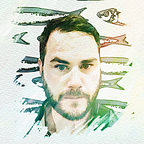AI Bias, Decision Bubbles, Death, and Generations
Thoughtful Net #69: curated links from the past week
For a supposed ‘more than monthly’ publication, this is actually the first time that I’ve managed to send two editions out in the same month since October last year. Mind you, I’ve only managed to do that by keeping it down to six stories. I’ve not had much time to read recently as I started a new job three weeks ago and my commute is much shorter; I used to read four or five articles a day, and I’m barely managing that a week at the moment. Plenty to catch up on.
My new job’s working in a technical innovation role. Innovation’s often confused (or conflated) with novelty, but sometimes it’s just about combining familiar ideas in an unfamiliar way. David Sax put it well:
True innovation isn’t just some magic carnival of invention. It is a continuing process of gradual improvement and assessment. Often that actually means adopting ideas and tools that already exist but make sense in a new context, or even returning to methods that worked in the past.
Onto the links! There are some crackers this month — including two bests.
The Best
Notes on AI Bias, Benedict Evans.
A seriously clever and clear explanation of bias in machine learning systems — and it’s probably not what you think (if you think of it at all).
A washing machine is much better than a human at washing clothes, but if you put dishes in a washing machine instead of clothes and press start, it will wash them. They’ll even get clean. But this won’t be the result you were looking for, and it won’t be because the system is biased against dishes. A washing machine doesn’t know what clothes or dishes are — it’s just a piece of automation, and it is not conceptually very different from any previous wave of automation.
The Filter Bubble is Actually a Decision Bubble, Thomas Baekdal.
People don’t suffer from a lack of exposure to alternative viewpoints, they suffer from excessive exposure to ‘balanced’ viewpoints.
By constantly exposing people to alternative viewpoints, you are teaching the public not to trust anything. Because every single time they read about a fact from one news source, [they will be presented] with an ‘alternative fact’ (for the sake of balance) from another news source. You are telling people that information and facts are a matter of viewpoints, and that there are always alternative facts to be had. It’s the worst thing you can possibly do.
NB: This really annoys me; I wrote about it in How a Google Maps Update Leads to the Promotion of Fringe Views.
Death and the Internet
The Complexity of Grieving in the Digital Age, Debra Bassett.
How messages stored on our phones and other devices take on new significance when the sender dies. I love this term: “the socially active dead”. After my sister died I always got a little welcome/unwelcome shock when I saw her profile photo in the top scores of Candy Crush.
The dead are no longer hidden away, they are carried with us on our digital devices in the form of voicemails, WhatsApp messages, texts and photographs. But these social networks and messaging services were designed for people to stay in touch with the living. Using them to talk with the dead is blurring the distinction between the social lives of the living and those of the “socially active dead.”
The Body Pullers of Syria, Kenneth Rosen.
A difficult read, this: how teams of volunteers in Syria locate graves of civilians and ISIS fighters. Every time I read someone from the privileged Western commentariat talk about ‘burning social media to the ground’ I want to show them stories like this, where social networks enable critical use cases we’ve never been forced to consider.
The team uses Google Maps or Google Earth and satellite images to begin to map potential [grave] locations. Once an area is marked as a potential site, the teams use Facebook and WhatsApp to crowdsource more information. They post messages saying they have “opened” (the term of choice) a new mass grave and give its location.
Generations Online
Old, Online, And Fed On Lies: How An Aging Population Will Reshape The Internet, Craig Silverman.
People aged over 65 make up increasingly large sector of the British and American population, and as they move online they’re largely moving to Facebook. This is a problem as they’re the least digitally literate demographic — and the most politically active.
Since the 2016 election, funding for digital literacy programs has skyrocketed. But they primarily focus on younger demographics, even as the next presidential election grows closer. This means the very people who struggle the most with digital information and technology risk being left to fend for themselves in an environment where they’re being targeted and exploited precisely because of their vulnerabilities.
Why Are People Starting to Purge All of Their Instagram Photos?, Hussein Kesvani.
The generation that’s grown up on social media use it quite differently from the generations which had it appear in their lives. How many of the fears we have about teens and social media are down to us projecting our own experiences?
Older generations grew up on platforms where you upload whole photo albums from a party, which probably still exist on Facebook. But teenagers today don’t view photos in that way. It’s more about capturing a moment immediately, rather than keeping it as a memorial.
The Thoughtful Net is an occasional (less than weekly, more than monthly) publication collecting great writing about the internet and technology, culture, information, society, science, and philosophy. If you prefer to receive it in your inbox you can follow this publication or subscribe to the email newsletter.
